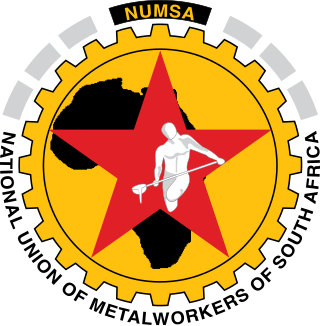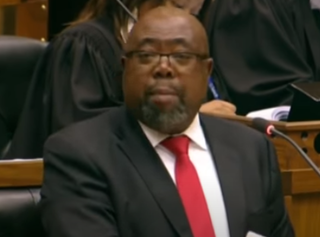Related Research Articles

The South African Communist Party (SACP) is a communist party in South Africa. It was founded in 1921 as the Communist Party of South Africa (CPSA), tactically dissolved itself in 1950 in the face of being declared illegal by the governing National Party under the Suppression of Communism Act, 1950. The Communist Party was reconstituted underground and re-launched as the SACP in 1953, participating in the struggle to end the apartheid system. It is a member of the ruling Tripartite Alliance alongside the African National Congress and the Congress of South African Trade Unions (COSATU) and through this it influences the South African government. The party's Central Committee is the party's highest decision-making structure.
Joe Slovo was a South African politician, and an opponent of the apartheid system. A Marxist-Leninist, he was a long-time leader and theorist in the South African Communist Party (SACP), a leading member of the African National Congress (ANC), and a commander of the ANC's military wing uMkhonto we Sizwe (MK).
The Australian labour movement began in the early 19th century and since the late 19th century has included industrial and political wings. Trade unions in Australia may be organised on the basis of craft unionism, general unionism, or industrial unionism. Almost all unions in Australia are affiliated with the Australian Council of Trade Unions (ACTU), many of which have undergone a significant process of amalgamations, especially in the late 1980s and early 1990s. The leadership and membership of unions hold and have at other times held a wide range of political views, including communist, socialist and right-wing views.

The International Federation of Journalists (IFJ) is the largest global union federation of journalists' trade unions in the world. It represents more than 600,000 media workers from 187 organisations in 146 countries.

The National Union of Metalworkers of South Africa (NUMSA) is the biggest single trade union in South Africa with more than 338,000 members, and prior to its expulsion on 8 November 2014, the largest affiliate of the Congress of South African Trade Unions (COSATU), the country's largest trade union federation.
Trade unions in South Africa has a history dating back to the 1880s. From the beginning unions could be viewed as a reflection of the racial disunity of the country, with the earliest unions being predominantly for white workers. Through the turbulent years of 1948–1991 trade unions played an important part in developing political and economic resistance, and eventually were one of the driving forces in realising the transition to an inclusive democratic government.

James Thomson "JT" Bain was a socialist and syndicalist in colonial South Africa.

The Federation of South African Trade Unions (FOSATU) was a trade union federation in South Africa.

Internal resistance to apartheid in South Africa originated from several independent sectors of South African society and took forms ranging from social movements and passive resistance to guerrilla warfare. Mass action against the ruling National Party (NP) government, coupled with South Africa's growing international isolation and economic sanctions, were instrumental in leading to negotiations to end apartheid, which began formally in 1990 and ended with South Africa's first multiracial elections under a universal franchise in 1994.

The Amalgamated Society of Boilermakers, Shipwrights, Blacksmiths and Structural Workers (ASB) was a trade union in the United Kingdom. Many of its members worked in shipbuilding, in which industry it was the leading trade union, while over time it also developed strength in engineering and construction.

Thembelani Waltermade "Thulas" Nxesi is a South African politician and former trade unionist who has been the Minister of Employment and Labour since May 2019. A representative of the African National Congress (ANC), he has been a member of cabinet since October 2011 and the Deputy National Chairperson of the South African Communist Party (SACP) since July 2012.
The South African Railways and Harbours Union was formed by black workers of the South African Railways and Harbours Administration after they had been expelled from the National Union of Railway and Harbour Servants.
The Council of Non-European Trade Unions (CNETU) was a national trade union federation bringing together unions representing black African workers in South Africa.
The South African Congress of Trade Unions (SACTU) was a national trade union federation in South Africa.

The Industrial Workers of the World (South Africa) or IWW (SA) had a brief but notable history in the 1910s-20s, and is particularly noted for its influence on the syndicalist movement in southern Africa through its promotion of the IWW's principles of industrial unionism, solidarity, and direct action, as well as its role in the creation of organizations such as the Industrial Workers of Africa and the Industrial and Commercial Workers' Union.
The South African Trades and Labour Council (SAT&LC) was a national trade union federation in South Africa.
The African Clothing Workers' Union (ACWU) was a trade union representing workers in the garment industry South Africa.
The South African Iron and Steel Trades Association was a trade union representing white metalworkers in South Africa.
Max Gordon was a South African trade union leader and Trotskyist activist.
Jerry Dimotana Thibedi is a South African politician who represented the African National Congress (ANC) in the National Assembly from 2010 to 2019 and in the North West Provincial Legislature from 1994 to 2009. He was the inaugural Speaker of the North West Provincial Legislature between 1994 and 1999 and subsequently served in the North West Executive Council between 1999 and 2009 under Premiers Popo Molefe and Edna Molewa.
References
- 1 2 3 Hirson, Baruch (1989). Yours for the Union. London: Zed Books. pp. 40–42. ISBN 086232369X.